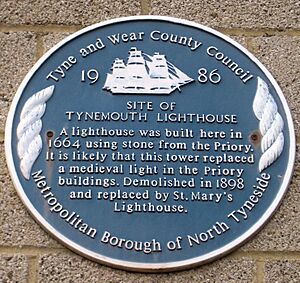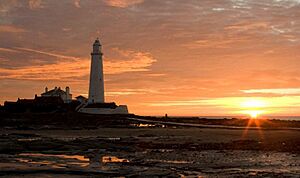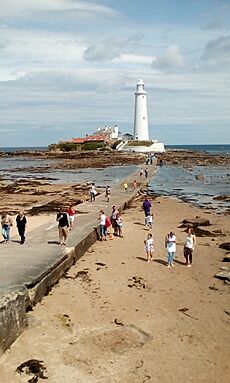St Mary's Lighthouse facts for kids
| Location | St Mary's Island Tyne and Wear England |
|---|---|
| Coordinates | 55°04′18″N 1°26′58″W / 55.071656°N 1.449444°W |
| Year first constructed | 1898 |
| Automated | 1982 |
| Deactivated | 1984 |
| Construction | brick tower |
| Tower shape | tapered cylindrical tower with balcony and lantern |
| Markings / pattern | white tower and lantern |
| Height | 46 metres (151 ft) |
| Range | 17 nmi (31 km; 20 mi) |
| Characteristic | Fl(2) W 20s. |
St Mary's Lighthouse stands on a small piece of land called St Mary's Island. This island is just north of Whitley Bay on the coast of North East England. It's also known as Bait Island. The island is rocky and connected to the mainland by a short concrete path. This path gets covered by water when the tide is high.
Contents
The Lighthouse's Story
Long ago, in the 11th century, monks at Tynemouth Priory had a lantern. They kept this light on their chapel tower. It helped warn ships about dangerous rocks nearby. Later, in 1664, a lighthouse was built where the Tynemouth Coastguard station is now. Stones from the old priory were used to build it.
The lighthouse you see today on St Mary's Island was built much later. It was finished in 1898 by the John Miller company. They used many stone blocks and bricks to build it. A special spinning lens, called a 'bi-valve' Fresnel lens, was put inside. This lens was made in Paris and was very similar to one used in another lighthouse. It made the light flash twice every 20 seconds.
At first, the lamp used paraffin oil to shine. It wasn't changed to electric power until 1977. St Mary's was the last lighthouse run by Trinity House to use oil. When it became electric, the beautiful old lens was taken out. It was later shown in a museum. A new, modern light system was put in its place. This new system used powerful lamps and was powered by batteries.
When the Light Went Out
The lighthouse stopped working in 1984. This happened two years after it was made automatic. The modern light system was later moved to another lighthouse platform in the North Sea. That platform became the first major lighthouse to use solar power. In 1986, a special blue plaque was put up. It tells about the lighthouse's early history.
A few years after it closed, the local council opened St Mary's as a place for visitors. Trinity House gave them a smaller lens from another lighthouse. You can still see this lens at the top of the tower today. In 2011, the original large lens was brought back to St Mary's. It is now on display for everyone to see.
St Mary's Lighthouse Today
Since 2012, St Mary's Lighthouse has been a grade II listed building. This means it's an important historical building. Even though it doesn't guide ships anymore, it's a popular place to visit. You can easily reach it when the tide is low.
The lighthouse is open regularly for visitors. Inside, there's a small museum where you can learn about its past. There's also a visitor's centre and a café. In 2014, the keeper's cottage was updated with a special heating system.
In 2017, there were plans to make the site even better. These plans included new viewing platforms. However, they were not approved because of worries about the environment. A new plan was suggested in 2018. This plan included putting the original lens back into the tower. But the funding for this project was not approved. In 2024, the lighthouse and its cottages were repainted. Other general repairs were also done to keep them in good shape.
Other Lighthouses Nearby
You can find another old lighthouse a few miles south of the River Tyne. This is Souter Lighthouse. It also no longer works as a lighthouse but is open to visitors. You can even see it from the top of St Mary's Lighthouse on a clear day.
Closer by, there are lighthouses at Tynemouth and South Shields. These mark the entrance to the River Tyne. To the north, Trinity House still operates two lighthouses. They are located on the Farne Islands.
See also
- List of lighthouses in England
 | William Lucy |
 | Charles Hayes |
 | Cleveland Robinson |




